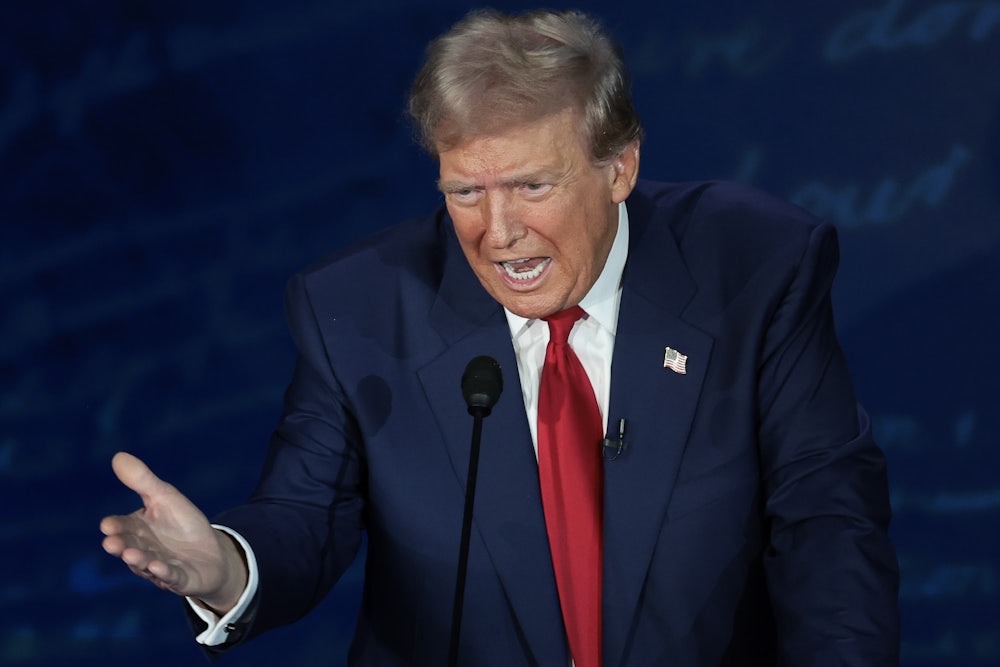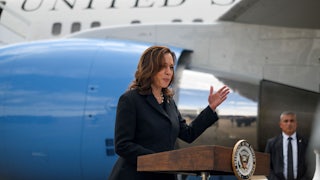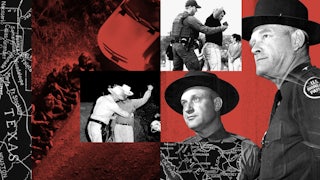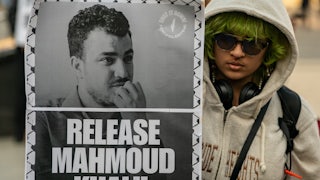“We have to have borders, and we have to have good elections,” said Donald Trump during his first presidential debate facing Vice President Kamala Harris on Tuesday. “Our elections are bad. And a lot of these illegal immigrants coming in, they’re trying to get them to vote. They can’t even speak English. They don’t even know what country they’re in, practically. And these people are trying to get them to vote, and that’s why they’re allowing them to come into our country.” All night, Trump returned to his themes of immigrants as criminals. And while it may have looked like Trump was veering wildly from the border to election integrity (the way he veers wildly and free associates from practically every topic), the pairing of these two subjects was no accident. It was more than just his refuge from questions he didn’t want to answer. It’s part of a growing narrative through which Trump and his acolytes appear to be lining up a cover story for another attempt to steal an election: Blame immigrants, blame Democrats, blame the border.
Trump’s seemingly jumbled riff at the debate recalled a campaign stop he made in front of a section of his beloved border wall in the Arizona desert in August: “We gotta clean up our borders, we have got to clean up our elections, or we’re not going to have a country,” Trump said, almost casually, like it was a routine line.
Republicans have long used the idea of immigrants voting illegally to justify voter suppression efforts, like requiring voters to provide state-issued identification at polling places. But the more recent twist now is to construct a scheme they say is led by Democrats to use migrants who have recently arrived to commit (nonexistent) voter fraud, sometimes seizing on the work of groups aiding recently arrived migrants, and capitalizing on social media’s power to make a lie louder than the truth. Trump’s running mate, J.D. Vance, has a history with this kind of narrative, part of how he also indulges far-right “great replacement” conspiracy theories—this idea that white voters who are American citizens are being deliberately “replaced” by immigrants and by people of color. “Biden’s open border is killing Ohioans,” a 2022 Vance for U.S. Senate campaign ad went, “with more illegal drugs and more Democrat voters pouring into this country.” As my colleague Greg Sargent noted at the time, Vance was suggesting that “‘Democrat voters’ in the form of migrants are one factor ‘killing Ohioans.’ That’s partly a reference to drugs crossing the border, but the hint at an apocalyptic demographic threat is obvious.” In August, at a campaign event in North Carolina, Vance said it as succinctly as anyone on that campaign can, only now about Harris: “Her party wants more power, and the way they’re going to do it is, she wants to give all those illegal aliens the right to vote.”
Trump’s fictions about immigrants are growing increasingly phantasmagorical—as in Tuesday night’s made-up stories about immigrants in Springfield, Ohio, eating pets. But there’s a similar twisting of reality when he talks about election fraud: In several cases, what he actually seems to be describing would more accurately be described as legal efforts to hold him accountable for abuses of power.
At a Wisconsin rally on September 7, Trump went on a rant involving Aurora, Colorado. Trump claimed that in Colorado, whole apartment complexes were ruled by what he characterized as gangs from Venezuela—a preview, he said, for the rest of us. “You haven’t seen the migrant crime yet; it’s started, and it’s vicious.” But Colorado holds another special meaning for Trump. He continued, “Colorado began the threat to democracy against me where they tried to unconstitutionally remove me from the ballot … and then they say I’m a threat to democracy, think about that.” From there, Trump moved onto the more widely reported segment of his remarks, seeming to promise bloodshed: “In Colorado they’re so brazen they’ve taken over sections of the state, and you know, getting them out will be a bloody story, they should have never been allowed to come into our country.”
Those who backed Trump’s attempts to overturn the 2020 election results are now taking up this narrative of “illegal immigrants” and election fraud. In May, House Speaker Mike Johnson promoted a bill to require voters in federal elections to prove their citizenship—when noncitizens are already barred from voting in federal elections. “We cannot wait for widespread fraud to occur, especially when the threat of fraud is growing with every single illegal immigrant that crosses that border,” Johnson said in April, standing alongside Trump at Mar-a-Lago. A growing number of states are considering such redundant prohibitions. In this election, Kentucky is one of eight states where voters will consider bans on noncitizen voting.
Some conservative groups—including the Heritage Foundation, which was also behind Project 2025—are already mobilizing to confront purported acts of election fraud by noncitizens, building on past efforts, adding what they learned from 2020. Some Republican state officials have joined them, such as Texas Attorney General Ken Paxton, who has launched an “investigation” premised on a conspiracy theory. Cleta Mitchell, one of the architects of the “Stop the Steal” effort, helped found a national campaign to train people to monitor elections in their own communities, premised on the lie that “millions” of noncitizens may vote in November. One member, the group Only Citizens Vote, has accused election officials who were hiring poll workers who speak Spanish of hiring undocumented immigrants. They are sending election workers signs designed to be placed in polling locations. The signs read, “Voting by noncitizens is a criminal, deportable offense”—in English and Spanish. The New York Times recently obtained a recording of a Zoom meeting in which one of the activists suggested searching official voter records for “ethnic names” to flag as possible noncitizens.
Above all, Trump uses his narratives about the border to prepare people for the idea of exceptional and extreme responses, perhaps involving the military. The migrant “invasion” rhetoric pushed by Trump and key allies like Texas Governor Greg Abbott serves in part as groundwork for putting down this “invasion.” Trump has already entertained the idea of using such an exceptional response to shut down political enemies and domestic unrest. As president, he used agents who police the border to police protests. “The same Border Patrol tactical teams currently on the ground in Oregon,” reported Ryan Deveraux for The Intercept amid the George Floyd protests in 2020, “were also deployed to provide muscle and a visible show of strength for Immigration and Customs Enforcement officers conducting a crackdown on New York and other so-called sanctuary cities.”
If Trump saw a crackdown on immigrants and protesters as requiring the same force, this may also give us a sense of his plans after the election. Russ Vought, recently of Project 2025, an attempt to prepare an incoming Trump administration, detailed the project participants’ current thinking, in what he thought was a private meeting this summer. “We put out, for instance, a 50-page paper designed for lawyers to know that the president has, you know, the ability both along the border and elsewhere to maintain law and order with the military,” Vought said in a leaked video, “and that’s something that, you know, that’s going to be important for him to remember and his lawyers to affirm.” Meanwhile, as these advisers plan their postelection game, completely unfounded claims of widespread fraud by immigrants have been spreading on social media—long before voting has begun, noted Michael Waldman, president of the Brennan Center for Justice, at an August congressional hearing. “This year,” he said, “the ‘Big Lie’ is being pre-deployed.”








